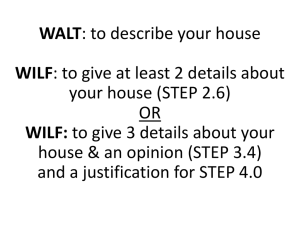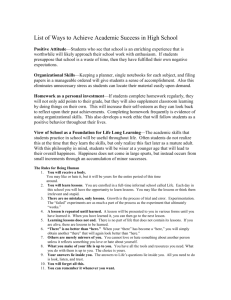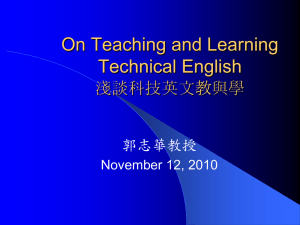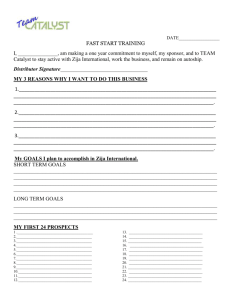Year 7 School
advertisement
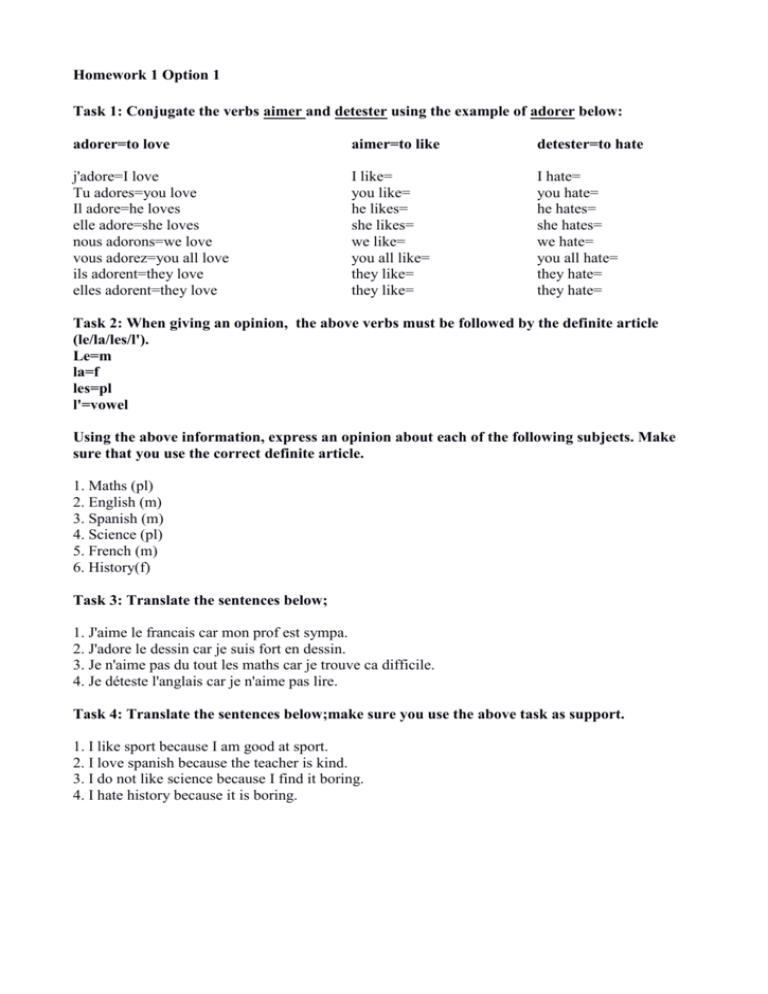
Homework 1 Option 1 Task 1: Conjugate the verbs aimer and detester using the example of adorer below: adorer=to love aimer=to like detester=to hate j'adore=I love Tu adores=you love Il adore=he loves elle adore=she loves nous adorons=we love vous adorez=you all love ils adorent=they love elles adorent=they love I like= you like= he likes= she likes= we like= you all like= they like= they like= I hate= you hate= he hates= she hates= we hate= you all hate= they hate= they hate= Task 2: When giving an opinion, the above verbs must be followed by the definite article (le/la/les/l'). Le=m la=f les=pl l'=vowel Using the above information, express an opinion about each of the following subjects. Make sure that you use the correct definite article. 1. Maths (pl) 2. English (m) 3. Spanish (m) 4. Science (pl) 5. French (m) 6. History(f) Task 3: Translate the sentences below; 1. J'aime le francais car mon prof est sympa. 2. J'adore le dessin car je suis fort en dessin. 3. Je n'aime pas du tout les maths car je trouve ca difficile. 4. Je déteste l'anglais car je n'aime pas lire. Task 4: Translate the sentences below;make sure you use the above task as support. 1. I like sport because I am good at sport. 2. I love spanish because the teacher is kind. 3. I do not like science because I find it boring. 4. I hate history because it is boring. Homework 1 Option 2 Task 1: Conjugate the verbs aimer and detester using the example of adorer below: adorer=to love aimer=to like detester=to hate j'adore=I love Tu adores=you love Il adore=he loves elle adore=she loves nous adorons=we love vous adorez=you all love ils adorent=they love elles adorent=they love I like= you like= he likes= she likes= we like= you all like= they like= they like= I hate= you hate= he hates= she hates= we hate= you all hate= they hate= they hate= Task 2: When giving an opinion, the above verbs must be followed by the definite article (le/la/les/l'). Le=m la=f les=pl l'=vowel Using the above information, express an opinion about each of the following subjects. Make sure that you use the correct definite article. 1. Maths (pl) 2. English (m) 3. Spanish (m) 4. Science (pl) 5. French (m) 6. History(f) Task 3: Translate the sentences below; 1. J'aime le francais car mon prof est sympa. 2. J'adore le dessin car je suis fort en dessin. 3. Je n'aime pas du tout les maths car je trouve ca difficile. 4. Je déteste l'anglais car je n'aime pas lire. Task 4: Translate the sentences below;make sure you use the above task as support. 1. I like sport because I am good at sport. 2. I love spanish because the teacher is kind. 3. I do not like science because I find it boring. 4. I hate history because it is boring. Task 5: Improve the sentences above Homework 2 Option 1 Task 1: Translate the numbers 1. vingt 2. trente 3. dix 4.quarante 5.cinquante 6.soixante-dix 7.soixante 8.quinze 9.quatre-vingts 10.quatre-vingts-dix Task 2: Translate the times below into English; 1. Il est huit heures 2. Il est neuf heures et quart 3. Il est six heures et demi 4. Il est dix heures dix 5. Il est vingt heures 6. Il est sept heures vint 7. Il est quinze heures trente 8. Il est midi 9. Il est une heure vingt-cinq 10. Il est onze heures moins quart Task 3: Translate the times below into French 1. It is ten o clocks 2. It is quarter past five 3. It is ten past two 4. It is half past seven 5. It is twenty past eight 6. It is nine fifteen 7. It is four forty 8. It is ten forty pm Homework 2 Option 2 Task 1: Translate the numbers 1. vingt 2. trente 3. dix 4.quarante 5.cinquante 6.soixante-dix 7.soixante 8.quinze 9.quatre-vingts 10.quatre-vingts-dix Task 2: Translate the times below into English; 1. Il est huit heures 2. Il est neuf heures et quart 3. Il est six heures et demi 4. Il est dix heures dix 5. Il est vingt heures 6. Il est sept heures vint 7. Il est quinze heures trente 8. Il est midi 9. Il est une heure vingt-cinq 10. Il est onze heures moins quart Task 3: Change the 'past' the hour times, to 'to' the hour times. Task 4: Translate the times below into French Task 5: Write the times below in the twenty four hour clock as well as the twelve hour clock. 1. It is ten o clocks 2. It is quarter past five 3. It is ten past two 4. It is half past seven 5. It is twenty past eight 6. It is nine fifteen 7. It is four forty 8. It is ten forty pm Homework 3: Present tense verb tables Je Tu Il/elle/on Nous Vous Ils/elles To chat To finish To wait Tchatter tchatte tchattes tchatte tchattons tchattez tchattent Finir finis finis finit finissons finissez finissent attendre attends attends attend attendons attendez attendent -Verbs must be 'conjugated' (changed) to show who is carrying out the action. - In French, to conjugate verbs fully, you need a pronoun to indicate who is doing the action (for example Je, tu etc) and the ending on the verb also needs to change. - The endings are different depending upon who is doing the action. -They are also different depending upon what verb group the verb belongs to (ir/re/er) -Verbs do not need to be conjugated, when an opinion verb precedes them (e.g j'aime) Task 1: Using the above verb tables, conjugate the following verbs. Make sure you lay it out as above. To play Jouer To choose choisir To sell vendre Task 3: Spot the mistakes in the sentences and correct them, using the above. 1. Normalement je manger a la cantine. (manger) 2. Pendant la récré moi et mes amis, nous jouent au foot. (jouer) 3. J'adore apprendre le français. (apprendre) 4. Mon ami adorons le sport. (adorer) 5. Tu aime bavarder avec tes amis? (aimer) 6. Je finissez les cours vers trois heures. (finir) Homework 4 Option 1 Task 1: Possessives In French, there are 3 words for 'my' Mon=for male things Ma=for female things Mes=for plural things e.g Mon frère=My brother. Ma chaise=my chair (chair=f) With the below words, choose the correct possessive and rewrite the sentence. Watch out for plural words! 1. table (f) 2. professeur (m) 3. cahier (m) 4. gommes (f) 5. règle (f) 6. dictionnaire (m) 7. tableaux (m) 8. sac (m) Task 2: Translate these comparisons. 1. Mon prof de français est plus sympa que mon prof de maths. 2. Mon prof d'histoire est plus amusant que mon prof de sciences. 3. Mon prof de sciences est moins gentil que mon prof de sport. 4. Mon prof d'anglais est plus strict que mon prof de géographie. Task 3: Highlight/underline the elements of the sentences you could change to make these your own. Task 4: Make your own 4 sentences below. Task 5: Improve this text by adding connectives and adjectives so it is more descriptive. Je vais a un collège s'appelle Burnt Mill. Dans mon collège il y a trente salles de classes. Il y a une piscine et un gymnase. Il y a une salle d'ordinateur. Il y a un terrain de foot. Il n'y a pas de salle d'art dramatique. Homework 4 Option 2 Conditional tense This is formed by taking the infinitive (the verb in its dictionary form) of 'ir' and 'er' verbs and adding the following endings. Note, that for 're' verbs, the 'e' is removed, before adding the below endings; je tu il/elle nous vous ils/elles ais ais ait ions iez aient Task 1: Using the above, conjugate the following verbs. Aimer to like Choisir to choose Prendre to take There are some exceptions. Their stems are listed below. aller --> ir --> j'irais (I would go) avoir --> aur --> j'aurais (I would have) être --> ser --> je serais (I would be) faire --> fer --> je ferais (I would do) pouvoir --> pourr --> je pourrais (I would be able to) devoir --> devr --> je devrais (I would have to) savoir --> saur --> je saurais (I would know) venir --> viendr --> je viendrais (I would come) voir --> verr --> je verrais (I would see) vouloir --> voudr --> Je voudrais (I would like) Task 2: Translate the text below into English. The verbs you need to know are listed in brackets. Dans le futur, j'aimerais voyager, peut-être en Afrique ou aux États-unis. Je voyagerais avec mes meilleurs amis car ca serait amusant. Aussi j'habiterais a Londres car j'aime Londres, c'est une ville très intéressant. Egalement j'irais a l'université les langues. Homework 5 Option 1 Task 1 : In French, when you use 'Je mange' and 'Je bois', you use something called the partitive article. This changes according to the gender of the food item. It means 'some' Du=masculine items of food de la=feminine items of food des=plural items of food de l'=infront of words beginning with a vowel Write out full sentences for the words below, using either 'je mange' or 'je bois' e.g Je mange des céréales. 1. fruit (m) 2. frites=chips (fpl) 3. coca=coke (m) 4. pain =bread(m) 5. oeuf=egg (m) 6. eau=water (f) Task 2: Definite article In French, when talking about what you like and dislike to eat you must use the definite article. This also changes according to the gender of the food item. This means 'the' le=masculine la=feminine l'=infront of a vowel les=plural Write out full sentences for the words below using either j'adore or je n'aime pas. 1. légumes=veg (pl) 2. lait=milk (m) 3. jambon=ham (m) 4. fromage=cheese (m) 5. viande=meat(f) Task 3: Choosing between definite and partitive articles. Translate the sentences below and check if you need the definite or partitive article (remember, directly after manger/boire there should be the partitive article). All the food items are in the sections above. You also need to check if they are masculine or feminine above. 1. I like (the) fruit 2. I love (the) bread 3. I eat (some) meat 4. I like to eat (some) vegetables 5. I hate (the) cheese 6. I do not like (the) eggs Homework 5 Option 2 Task 1: Translate these texts into English. D’habitude, l’heure de déjeuner je mange du poisson avec des frites cependant je ne mange pas de dessert car je n’aime pas de nourriture sucrée mais je prends un fruit. Je bois de jus d’orange car c’est plein de vitamines. D’habitude pendant l’heure du déjeuner, je mange un sandwich au fromage et jambon. Aussi je mange des chips et un fruit car c’est sain-des fois une pomme, des fois une banane. Task 2 : Write a list of the verbs in the next below and change them into the negative form. E.g J'aime=I like je n'aime pas=I do not like Task 3 : In French, when you use 'Je mange' and 'Je bois', you use something called the partitive article. This changes according to the gender of the food item. It means 'some' Du=masculine items of food de la=feminine items of food des=plural items of food de l'=infront of words beginning with a vowel Write out full sentences for the words below, using either 'je mange' or 'je bois' e.g Je mange des céréales. 1. fruit (m) 2. frites=chips (fpl) 3. coca=coke (m) 4. pain =bread(m) 5. oeuf=egg (m) 6. eau=water (f) Task 4: Definite article In French, when talking about what you like and dislike to eat you must use the definite article. This also changes according to the gender of the food item. This means 'the' le=masculine la=feminine l'=infront of a vowel les=plural Write out full sentences for the words below using either j'adore or je n'aime pas. 1. légumes=veg (pl) 2. lait=milk (m) 3. jambon=ham (m) 4. fromage=cheese (m) 5. viande=meat(f) Task 5: Choosing between definite and partitive articles. Translate the sentences below and check if you need the definite or partitive article (remember, directly after manger/boire there should be the partitive article). All the food items are in the sections above. You also need to check if they are masculine or feminine above. 1. I like (the) fruit 2. I love (the) bread 3. I eat (some) meat 4. I like to eat (some) vegetables 5. I hate (the) cheese 6. I do not like (the) eggs

